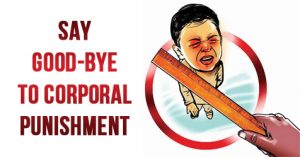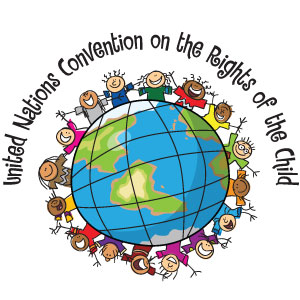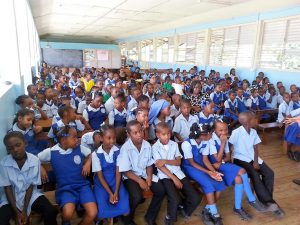I’ve mulled over this for the past month and I can’t recall anything in recent history which has caused national division in Saint Lucia other than the preparatory months of general elections. The matter which I speak of, is parliament receiving approval for the suspension of corporal punishment (CP), scheduled to take effect on May 1st, 2019, along with its abolition in May 2020.
For many, the decision on this complicated issue was long overdue; for others its a rushed one. It is alleged that the nucleus of this decision stems from an incident between a female secondary school student and her principal, where the student was struck in the face by the principal. As with all incidents, the rumors spread like a plague and the inconsistency and story lines were baffling. But with all that being said, the question is, did the government, and more specifically the Ministry of Education cater to the situation adequately?

First off, I do not believe that corporal punishment (CP) solves any one problem. From as far back as biblical times, CP has been ingrained in society, and endorsed by the Good Book in Proverbs 13:24. For generations, this practice has been upheld, intertwined into cultures and practiced in both the domestic and childhood education capacities. With that being said, the use of corporal punishment has had its share of negative impacts including the issue of child abuse in schools.
Unsurprisingly, majority of the populace who are against this suspension are either adults, middle aged and elderly persons. Those from the era when beating a child was basically the answer, when the community raised the child; when teachers were inadvertently your parents during the day, and were authorized to scold you. It is generally accepted in Black and Caribbean cultures, that such norms were pivotal in shaping the society, regardless of the fact that some educators were too ‘strap happy’ and even abusive. Such realities, triggered the United Nations (UN) to adopting a firm stance against corporal punishment, through its Convention on the Rights of the Child (UNCRC).

The UNCRC was developed in 1989 and is the first legally binding international instrument to incorporate the full range of human rights for children. It is a recognition by world leaders that children have human rights and people under 18 years old, often need special care and protection that adults do not. By agreeing to undertake the obligations of the Convention, governments across the world commit themselves to protecting and ensuring children’s rights and to hold themselves accountable for this commitment before the international community. With Saint Lucia being a member of the UN, the CP abolition conversation has existed for a while now.
According to the UN, the child has 12 rights, which include the Right to be Protected from Abuse and Neglect and states that;
“Every child will receive effective protection from harmful influences, abuse (physical & mental), neglect, corporal punishment and all forms of exploitation. Additionally, every child is provided opportunities to make complaints to an identifiable third party. Those caring for children are trained and given appropriate discipline techniques.” Based on all this, has government attempted to effectively facilitate such a mandate?
In Saint Lucia’s 1st UNCRC NGO Report on the state of human rights of children and youth in September 2011, government responded to the UNCRC’s recommendations for the prohibition of CP as,
“Amendment of the Education Act #41 of 1991 to prohibit the use of CP and to eradicate its use in the family remains a formidable challenge because it is part of the culture of discipline. Some attempts have been made to promote positive, non violent discipline in a manner consistent with the CRC in parenting programmes, public education programmes, piloting of the UNICEF/UNESCO Child-friendly School Initiative in 2009 (Fond Assau Primary; Bocage Secondary)”.
https://tbinternet.ohchr.org/Treaties/CRC/Shared%20Documents/LCA/INT_CRC_NGO_LCA_15754_E.pdf (see page 14)

The country submitted a 2013 update to that report which stated that : Efforts to eradicate corporal punishment in schools through a UNICEF/UNESCO sponsored Child-Friendly School (CFS) Initiative project- 2013 Status: After introduction of the initiative in the 2 Pilot schools (Fond Assau Primary; Bocage Secondary) in 2009 with needs assessments and teacher training, Saint Lucia was represented at a UNICEF Caribbean CFS Training-ofTrainers workshop to ‟enhance capacity to support national level CFS training for principals and school teams” in Trinidad in July 2012. Following this,18 primary schools (across the island) were enrolled in Phase 1.
https://tbinternet.ohchr.org/Treaties/CRC/Shared%20Documents/LCA/INT_CRC_NGO_LCA_15753_E.pdf (see page 2)
My research for a further update on this report proved futile, leaving me deviod of a proper understanding of the process leading to this latest decision. What were the reviews and the general consensus of the Child-Friendly School (CFS) Initiative project? Has an update been published? Unless such information has been clearly disseminated, and regardless of the fact that this topic has been debated in the past, government is simply being reactive. I believe that teachers were left on a limb, as the Ministry of Education, who happen to be their employers should be fighting their cause. To my knowledge, they have acted as the medium of communication, only in relation to informing the educators of this latest decision on CP via a February 20th circular.
I will not delve deeply into the issues that teachers are faced with, but munch on this. If for some reason there is no school for a day, parents go frantic. When vacation time hits the horizon, it’s instant paranoia. Why? Parents themselves regard their children as miserable, courageous enough to tell their teachers; “I can’t wait for school to reopen. I cant take the stress!” Sum it up with the fact that some of those same parents come to the schools to fight with these teachers, for correcting their children, who they can’t handle for a minute! Case in point, teachers are now toothless.

To set the record straight, I DO NOT subscribe to parliament’s decision and I conclude that it has left more questions than an actual solution. How do we replace CP? What solutions were introduced in the Child-Friendly School (CFS) Initiative project? How close are we to implementing an applicable solution? How do teachers deal with insubordinate, rowdy, disrespectful or even violent students? How do we deal with ‘at risk’ children? Does every single school in Saint Lucia even have a guidance counselor? Reflect on these before you call this decision ancient.
To everything in life there should be moderation, and this stance should be advocated for CP. Our future mandate should indicate distinctly, the material for punishing students, the maximum number of strokes, and should prohibit lashes about the body. CP will definitely not change a child’s character but if it were to be abolished, what would be the deterrent? Timeout? Putting students out of class? Having them write “I must behave better” 200 times? Good luck with that.


